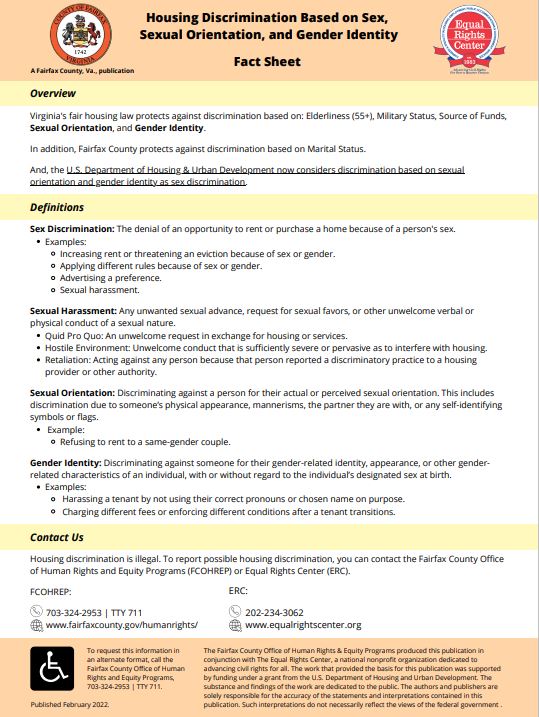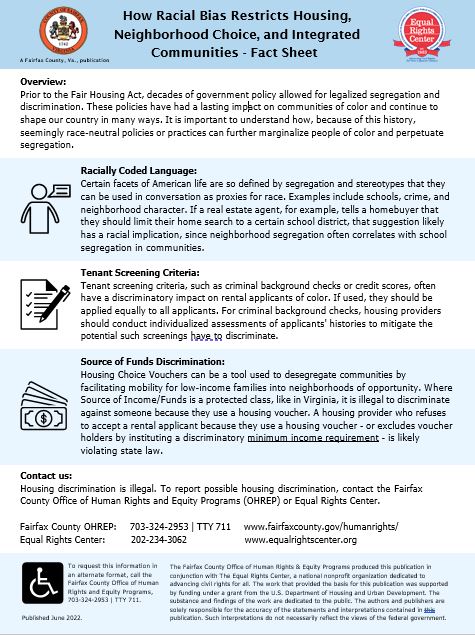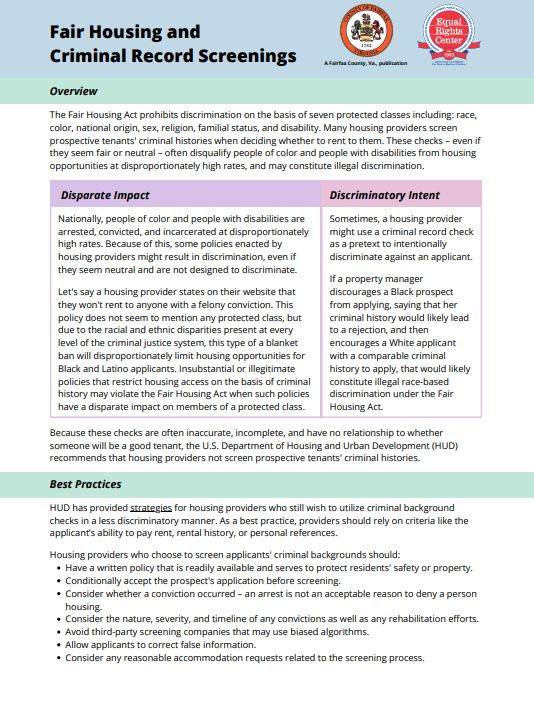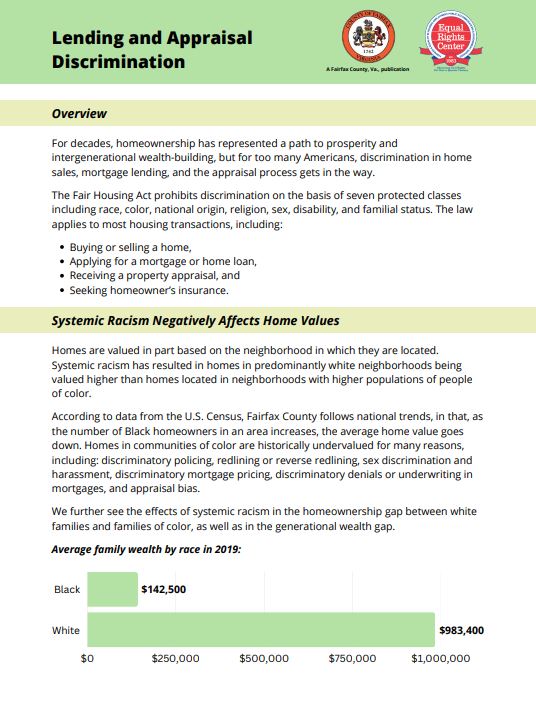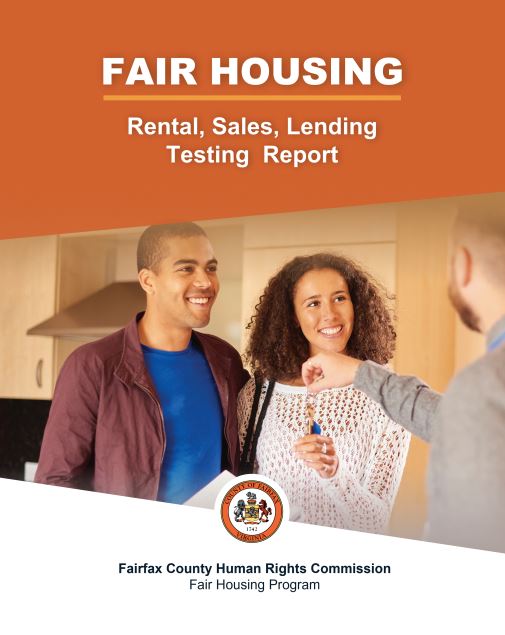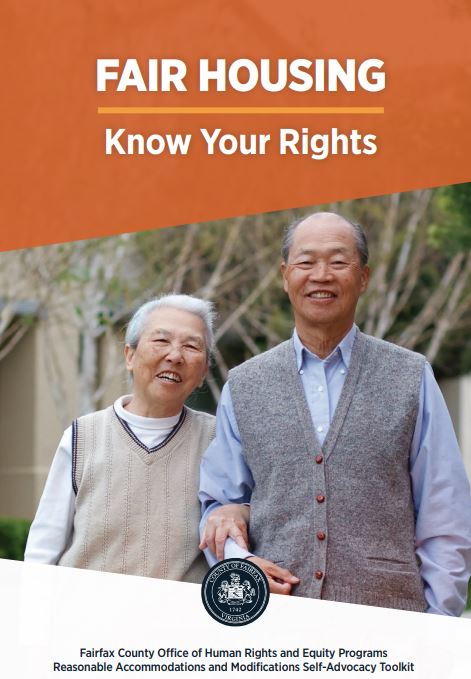 The purpose of this toolkit is to provide you with the tools necessary to recognize the barriers that may prevent you from the full use and enjoyment of your home and what you can do to eliminate them.
The purpose of this toolkit is to provide you with the tools necessary to recognize the barriers that may prevent you from the full use and enjoyment of your home and what you can do to eliminate them.
The federal Fair Housing Act (FHA) requires property owners to allow reasonable modifications and reasonable accommodations to persons with disabilities so that they can have full use and enjoyment of the property where they reside. The accessibility laws under the FHA ensure that, either through structural changes to the building (generally referred to as “reasonable modifications”) or changes in rules and policies (generally referred to as “reasonable accommodations”), people with disabilities have equal access to and enjoyment of their homes as do non-disabled persons.
If you are a person with a disability, you have the legal right to obtain a modification or accommodation to your dwelling, if it is a reasonable request and it is necessary to afford you access to and equal enjoyment of the property. This request can be made prior to moving into the unit or any time during your tenancy. This toolkit is designed to help you assert your civil rights and request a reasonable modification or a reasonable accommodation from your housing provider.
This toolkit includes:
- Information about your legal rights.
- Steps that will help you request a reasonable modification or accommodation.
- Templates for writing a request for a reasonable modification/accommodation.
- How and where to turn for help.
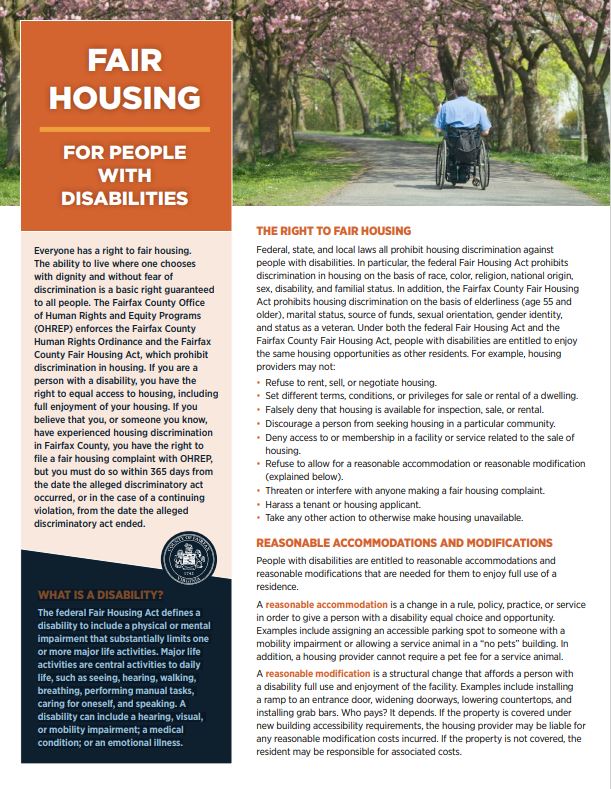 Everyone has a right to fair housing. The ability to live where one chooses with dignity and without fear of discrimination is a basic right guaranteed to all people. The Fairfax County Office of Human Rights and Equity Programs (OHREP) enforces the Fairfax County Human Rights Ordinance and the Fairfax County Fair Housing Act, which prohibit discrimination in housing. If you are a person with a disability, you have the right to equal access to housing, including full enjoyment of your housing. If you believe that you, or someone you know, have experienced housing discrimination in Fairfax County, you have the right to file a fair housing complaint with OHREP, but you must do so within 365 days from the date the alleged discriminatory act occurred, or in the case of a continuing violation, from the date the alleged discriminatory act ended.
Everyone has a right to fair housing. The ability to live where one chooses with dignity and without fear of discrimination is a basic right guaranteed to all people. The Fairfax County Office of Human Rights and Equity Programs (OHREP) enforces the Fairfax County Human Rights Ordinance and the Fairfax County Fair Housing Act, which prohibit discrimination in housing. If you are a person with a disability, you have the right to equal access to housing, including full enjoyment of your housing. If you believe that you, or someone you know, have experienced housing discrimination in Fairfax County, you have the right to file a fair housing complaint with OHREP, but you must do so within 365 days from the date the alleged discriminatory act occurred, or in the case of a continuing violation, from the date the alleged discriminatory act ended.
What is a Disability?
The federal Fair Housing Act defines a disability to include a physical or mental impairment that substantially limits one or more major life activities. Major life activities are central activities to daily life, such as seeing, hearing, walking, breathing, performing manual tasks, caring for oneself, and speaking. A disability can include a hearing, visual, or mobility impairment; a medical condition; or an emotional illness.
The Right to Fair Housing
Federal, state, and local laws all prohibit housing discrimination against people with disabilities. In particular, the federal Fair Housing Act prohibits discrimination in housing on the basis of race, color, religion, national origin, sex, disability, and familial status. In addition, the Fairfax County Fair Housing Act prohibits housing discrimination on the basis of elderliness (age 55 and older), marital status, source of funds, sexual orientation, gender identity, and status as a veteran. Under both the federal Fair Housing Act and the Fairfax County Fair Housing Act, people with disabilities are entitled to enjoy the same housing opportunities as other residents. For example, housing providers may not:
- Refuse to rent, sell, or negotiate housing.
- Set different terms, conditions, or privileges for sale or rental of a dwelling.
- Falsely deny that housing is available for inspection, sale, or rental.
- Discourage a person from seeking housing in a particular community.
- Deny access to or membership in a facility or service related to the sale of housing.
- Refuse to allow for a reasonable accommodation or reasonable modification (explained below).
- Threaten or interfere with anyone making a fair housing complaint.
- Harass a tenant or housing applicant.
- Take any other action to otherwise make housing unavailable.
Reasonable Accommodations and Modifications
People with disabilities are entitled to reasonable accommodations and reasonable modifications that are needed for them to enjoy full use of a residence.
- A reasonable accommodation is a change in a rule, policy, practice, or service in order to give a person with a disability equal choice and opportunity. Examples include assigning an accessible parking spot to someone with a mobility impairment or allowing a service animal in a “no pets” building. In addition, a housing provider cannot require a pet fee for a service animal.
- A reasonable modification is a structural change that affords a person with a disability full use and enjoyment of the facility. Examples include installing a ramp to an entrance door, widening doorways, lowering countertops, and installing grab bars. Who pays? It depends. If the property is covered under new building accessibility requirements, the housing provider may be liable for any reasonable modification costs incurred. If the property is not covered, the resident may be responsible for associated costs.
Fair Housing Accessibility Requirements
Apartments and other multifamily housing first occupied after March 13, 1991, must also meet certain basic levels of accessibility. The accessibility requirements apply to all units in buildings with four or more units that have an elevator. If a building with four or more units has no elevator and was first occupied after March 13, 1991, these standards apply to ground floor units only.
What Can a Housing Provider Ask?
Housing providers may inquire into an applicant’s ability to meet tenancy requirements. This means that a landlord may ask whether you have sufficient income to be able to pay the rent, whether you are willing to comply with the required rules (unless a reasonable accommodation is made), and other questions relating directly to tenancy. A housing provider may also adopt and apply uniform, objective, and nondiscriminatory criteria designed to evaluate a prospective tenant’s credit worthiness, such as requiring credit or criminal background checks.
If you have a disability, you cannot be treated differently just because you are a person with a disability, nor can you have your housing choice limited because of a disability. Reasonable accommodations and reasonable modifications have to be just that—reasonable. When a person makes a reasonable accommodation or modification request, a landlord has the right to examine the relationship between the request being made and the disability. However, the person making the request remains entitled to privacy.
Even when a person makes a request for a reasonable accommodation or modification, the landlord is only entitled to know that a disability exists and that the request is related to that disability. The individual making the request is not required to share the nature and full extent of the disability.
Questions like “Can you walk at all?”; “How did you lose your leg?”; or “How long have you had to use that wheelchair?” are all illegal. A landlord cannot talk to other tenants in the building about your disability. Your disability is no one’s business but your own.
Get Help
If you feel that you have experienced housing discrimination in Fairfax County because of a disability, you can file a complaint with OHREP within 365 days from the date of the alleged discrimination.
 Fair housing is your right! Housing discrimination happens in the process of renting, buying, selling or getting a loan for a home. It also includes discrimination that denies someone the use or enjoyment of their home.
Fair housing is your right! Housing discrimination happens in the process of renting, buying, selling or getting a loan for a home. It also includes discrimination that denies someone the use or enjoyment of their home.

